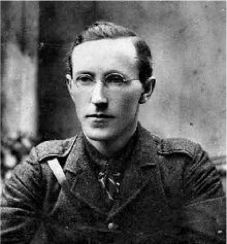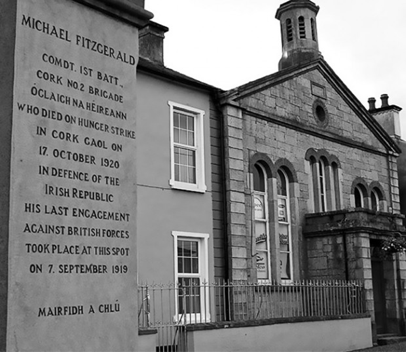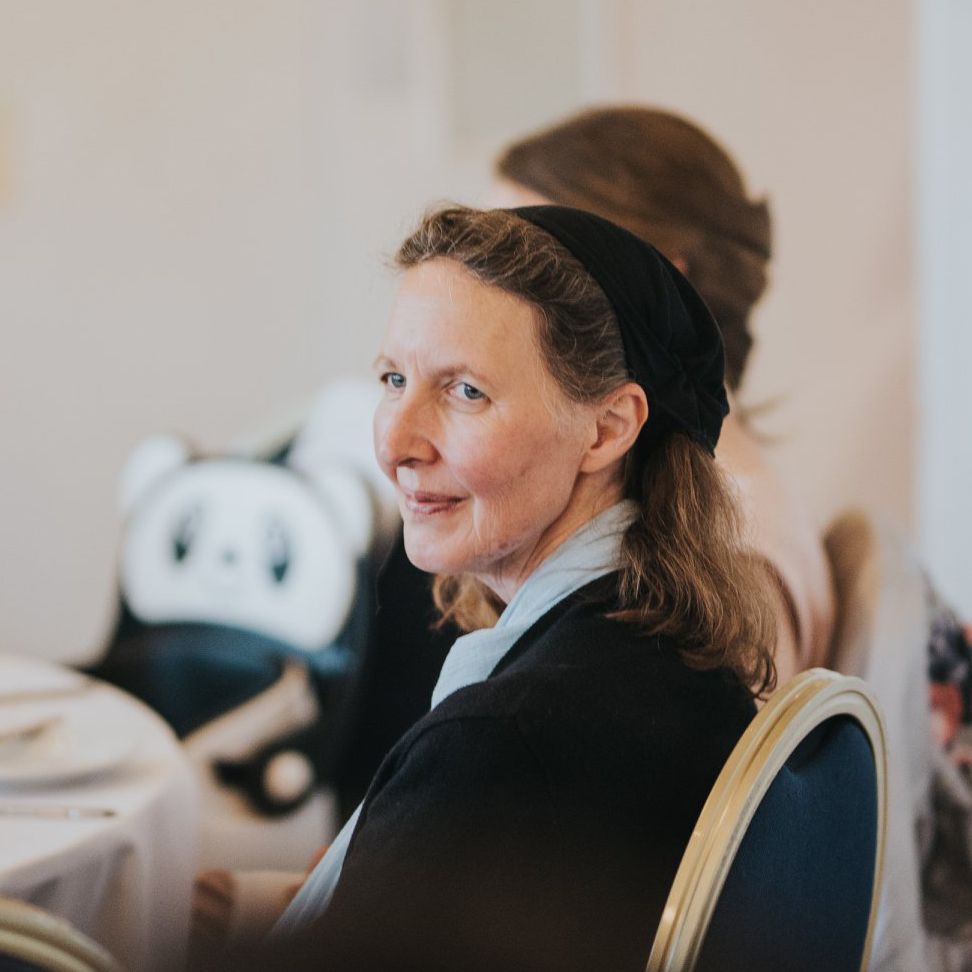Impending Fatherhood
It is not clear whether Poppy ever went to Ireland. The next letter Poppy had kept after her husband’s posting to Fermoy, was from CHTL to her mother, Mrs F.A. Holdsworth, dated Dec 8th 1919 and sent from ‘Brigade Hd Qrs, Fermoy Co. Cork.’
My dear Mrs Holdsworth
You have got our Poppy back by now, & I hope she is cheerful & as well as can be expected. She probably had a rotten night on her own at the Paddington, but as she took pity on a soldier and married him, although she does mind she doesn’t complain. You know now how matters stand. What we should like is for her to stay with you till April, when Dr Eden says she will be fit to travel out here…Dr Eden gave a very good report on her which was most satisfactory.
Things are much the same here just now. It is really a good deal quieter at the moment but as there is no reason for it, one expects an outburst shortly. It is bitterly cold here, both the house and the office is like the Arctic region, chiefly because the government coal is all wet dust & no fire will burn. Give my love to Poppy & Nurse, shant write tonight as I am still clearing off back work and haven’t much time. Am spending Thurs, Fri & Sat touring round the N. corner of Tipperary in an open Ford, hope the weather improves,
yrs affect,
Cuthbert
Finally the long awaited pregnancy had occurred. Both Poppy and CHTL had longed for children. At first things didn’t go as planned, being so far apart for most of the time didn’t help but also Poppy had difficulties getting pregnant:
“Poor old darling, but it is so important; its everything isn’t it? It makes so much difference if we can have a mutual interest, and keeps us together. People without children aren’t so happy as those who have, and get much more selfish, and wider apart.''
An earlier letter, from July 13th 1918
So finding out that Poppy was pregnant in December 1919 was a dream come true. CHTL would have preferred Poppy to have been safe back in England, away from the rising tensions in Ireland and close to her specialist doctor who could monitor what might well be a difficult pregnancy.
After one written to Poppy on 12th December 1919, there are no more letters in the family collection from CHTL to Poppy until just before he was captured. Presumably Poppy stayed in England; her mother had a brief illness and died unexpectedly on 6 February 1920. According to Mrs Holdsworth's obituary:
“the long illness of her husband, to whom she was deeply attached, and nursed with devoted attention, and his death in the early part of last year, affected her health... Mrs Holdsworth is a lady who will be sadly missed in the parish. The high respect in which the lady was held was shown by the large attendance of parishioners, during a boisterous storm, at the funeral, at Stokenham Churchyard on Tuesday afternoon. Muffled peals were rung during the afternoon, and the schools being closed, a number of school children attended the service.”
Kingsbridge Gazette, February 13th, 1920
The Kingsbridge Gazette does not record Poppy as being among the mourners, one can only assume that Poppy was not well enough to attend.There are indications that she was not experiencing an easy pregnancy and her mother's sudden death can't have helped. She suffered bouts of morning sickness right up until she gave birth. With a 'boisterous storm’ blowing icy February winds in from the sea, it was probably doctors orders that Poppy in her fragile state stayed safely in the warm.
One person who was named among the mourners, along with Poppy's brother and sister-in-law, is the ever faithful 'Miss Neill', the family's loyal Irish nurse, who was there by the family's side at their darkest hours and no doubt was there for Poppy at yet another tragic moment in her life.
Poppy would have had to stay in Devon to help sort out her mother’s effects. By the time Poppy had finished this she was no doubt tired and emotionally exhausted by her pregnancy, her mother’s death and the anxiety that her husband was once again in a dangerous situation. At that point, with no home left to go to, Poppy had no choice but to move to The Hall, the Lucas family’s new home in Welwyn, Herts and live with her in-laws.
Possibly CHTL's letters from this period were lost in the move.
CHTL decided that it was better for Poppy to stay with his family in Welwyn, which wasn’t too far from the nursing home in London where she would go for the birth. CHTL’s hands were full with the unrest in Ireland, and he could not deal with the trauma of childbirth. When his second son was born a year later, CHTL took himself off to play tennis, returning when the ‘event’ was over so he could greet his new son without having to deal with the anxiety and worry of seeing Poppy go through labour. This was not unusual amongst fathers of that time; the ‘new man’ had yet to evolve.
It wasn’t just fishing CHTL took part in during his time in Ireland, he also went on a shoot (that is of pheasants and other game birds).
My Piplett, …It has been raining all day & very warm; hope it clears up for our shoot tomorrow. Shant write any more, so don’t expect anything till I see you, when you will have all the hugs that have been saving up. Your C.
An earlier letter, from December 12th 19189
Ireland
The Ireland CHTL encountered in late 1919 was a place full of conflict and strife. The country was falling apart at the seams as the British government dragged its heels delaying the very thing that would have contributed greatly to bringing about peace in the region - Home Rule. In fact the Irish Republicans were not content to have just 'Home Rule'- they wanted full independence. The frustration and anger caused by politicians and the heavy-handed way they dealt with discontent fuelled the underground war.
The British would not recognise the conflict that they were embroiled in in Ireland as war - to them it was 'criminal activity' and as such should be dealt with by the police. However the R.I.C. were experiencing incredible opposition and difficulties. Many RIC barracks were burnt down and officers and their families lived ostracised from families and the communities that they had grown up in. Recruitment was way down and many RIC officers left the force.
The British solution was to officially give military back up to the RIC but in practice they took over from the police who they used as local guides. They turned the RIC stations into fortresses which emphasised the feeling that the police were besieged and in a state of war.
FORTIFIED FORTS.
"Nearly all the police barracks in Ireland are now fortified forts. Barbed wire entrenchments and sandbag barricades are dotted over the country; tanks and armoured cars patrol their roads. Soldiers in full fighting kit are concentrated in disturbed areas — and young Ireland is not dismayed."
(London Daily Mail, 11th December, 1919.)
An English MP, Capt. Wedgwood Benn described the chaos in August 1919:
`The fact is, Castle Government in Ireland is infamous. Men are spirited away without charge or trial, children are arrested for selling flags or whistling derisively at the police, fairs or markets on which the whole agricultural population depend for their livelihood are stupidly suppressed without cause. This fatuous reign of ineffective coercion brings its inevitable train of crime and outrage, and the criminals appear to be about the only persons who escape Mr. MacPherson's (Chief Secretary for Ireland) clutches.’
(Capt. Wedgwood Benn, English M.P., in letter to Edinburgh Evening News, quoted in Dublin Evening Telegraph of August 1, 1919.)
Comparisons were drawn with what happened to the Belgians during the Great War and those like CHTL who had seen the carnage must have felt very uneasy with the way things were going:
TO BE RID OF SINN FEIN.
The present military domination of Ireland is no less hideous than was that of Belgium by the German Imperialists. Many Unionists in Ireland are longing for an opportunity which will allow the Government under cover of legality to shoot down the Sinn Feiners wholesale, and so rid themselves of determined enemies without a break with America by ostensibly outraging all public morality. Again and again I have heard such opinions expressed by influential men occupying important positions.
(Statement of a British Officer in August, 1919.)
It seems inconceivable that any responsible members of Parliament or politicians would deliberately advocate the provocation of an outbreak in Ireland in the hope that Home Rule might thus be drowned in a sea of blood and repression; but we fear there are some who would contemplate a rebellion in Ireland at this time with thoughtless equanimity.
(London Times, November 27, 1919.)
On February 9th, 1920, Mr. W. N. Ewer, special correspondent of the Daily Herald in a report from Dublin wrote:
It is no mere surmise, but a known fact, based on authentic evidence, that there has been for some time past a group of officials which strongly advocates the provocation and bloody suppression of an armed rising.
On the other hand those who supported the Union felt besieged and under attack:
THE STATE OF IRELAND.
To THE EDITOR OF THE " SPECTATOR." 23 APRIL 1920
SIR,—We are in the most deplorable state over here. God only knows what the next movement will be. We are absolutely unprotected, the unfortunate police guarding their barracks behind sandbags and barbed wire, while all the might of the great British Empire is defied by these Sinn Feiners, who have just scored another triumph in forcing the Government to release their prisoners. They are apparently absolute masters now in Ireland, and may any day order the massacre of every Protestant or Unionist, when it would certainly be carried out. I have lived through pretty bad times in Ireland since 1879, but it was all child's-play to what is going on at present.—I
http://archive.spectator.co.uk/article/24th-april-1920/12/the-state-of-ireland
Battle lines were being drawn and frustrations at not getting what either side wanted meant that life in Ireland was rapidly disintegrating into a melee of tit for tat attack and retaliation.
Cork II IRA Brigade

The local Cork II IRA Brigade was formed on January 6th, 1919 as Volunteer John Fanning described:
The staff of Cork II Brigade was:
0/C Liam Lynch, Fermoy. Vice 0/C Dan Hegarty, Mallow. Adjutant Tom Barry, Glanworth. Q.M. George Power, Fermoy.
In the early part of 1919 drilling and parades continued. Volunteers at this stage were becoming more military-minded and great interest was taken in the occasional opportunities which arose to have some shooting practice with .22 rifle.
The next activity of note in the area was the capture of Araglin R.I.C. Barracks. With the exception of the Battalion 0/C (Mick Fitzgerald), this was I think a purely local job. During the Summer of 1919 there was no appreciable change in the Volunteer position. The usual activities -drill and parades - were carried on.
At this time small parties of the military (Shropshire Light Infantry) stationed in the military barracks used to parade to the churches of the various denominations in the town [Fermoy] on Sunday morning. It was noticed that a party of normally eighteen to twenty paraded each Sunday and marched to the Wesleyan Church, opposite the Gasworks at the end of Walker's Row. This party, as well as all the others, usually carried rifles. The Brigade 0/C (Liam Lynch) decided to examine the possibility of capturing the rifles carried by this party.
BUREAU OF MILITARY HISTORY, 1913-21. STATEMENT BY WITNESS. DOCUMENT NO. W.S. 990 Witness John Fanning, Member of Fermoy Company Irish Volunteers, Co. Cork, 1917 0/C. same Company, 1918

The raid took place and one British soldier, Private Jones, was killed.
Rioting by British troops in Fermoy followed. Many of the Volunteers were rounded up as suspects and were held for around six weeks before they were released because of lack of evidence.
They were all taken to Fermoy R.I.C. Barracks where they were placed on an identification parade that morning (Monday). Mick Fitzgerald was picked out by a soldier who said, “I think this man is like one of the men". District Inspector Lewis, R.I.C., who was in charge of the parade, said to the soldier, "Thinking Won't do you, boy!"
Once released the Volunteers returned to planning attacks.
About the end of January, 1920, arrangements were made by Moss Twomey (Battalion Adjutant) and George Power (Brigade Adjutant) to carry out an attack on Aghern R.I.C. Barracks. Volunteers from Araglin, Watergrasshill, Bartlemy, Fermoy and Castlelyons were mobilised for this job, but owing to intense enemy activity in the area on the date selected for the attack (1st Feb. 1920) the operation was called off.
After a spell in Wormwood Scrubs, John Fanning returned to Fermoy to find that Liam Lynch was planning Cork II Brigade's most daring action to date. Lynch's good friend, Michael Fitzgerald, was still being held for the Fermoy ambush and the IRA needed a bargaining tool to release him.This involved keeping a close tab on the movements and activities of a certain British general in Fermoy who was totally unaware that he was being stalked.
